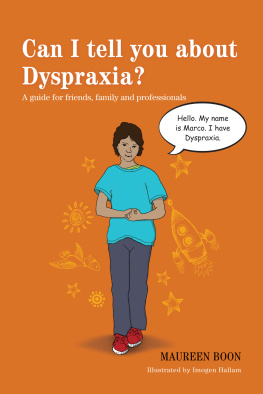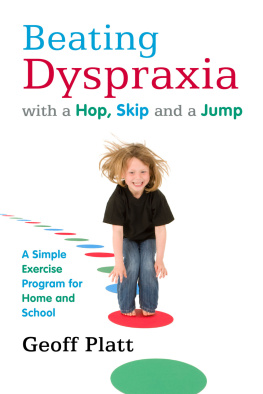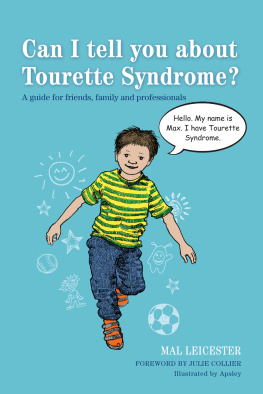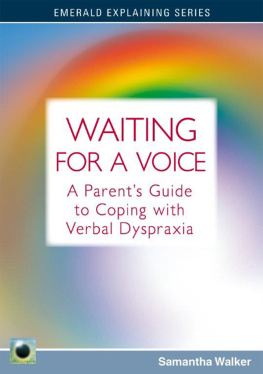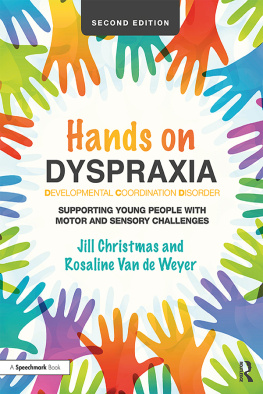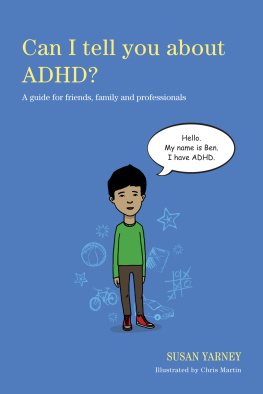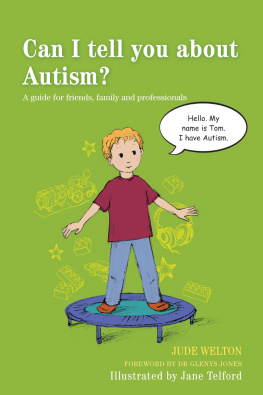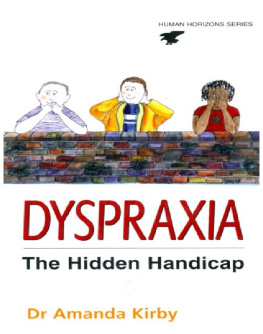First published in 2014
by Jessica Kingsley Publishers
73 Collier Street
London N1 9BE, UK
and
400 Market Street, Suite 400
Philadelphia, PA 19106, USA
www.jkp.com
Copyright Maureen Boon 2014
Illustrations copyright Imogen Hallam 2014
All rights reserved. No part of this publication may be reproduced in any material form (including photocopying or storing it in any medium by electronic means and whether or not transiently or incidentally to some other use of this publication) without the written permission of the copyright owner except in accordance with the provisions of the Copyright, Designs and Patents Act 1988 or under the terms of a licence issued by the Copyright Licensing Agency Ltd, Saffron House, 610 Kirby Street, London EC1N 8TS. Applications for the copyright owners written permission to reproduce any part of this publication should be addressed to the publisher.
Warning: The doing of an unauthorised act in relation to a copyright work may result in both a civil claim for damages and criminal prosecution.
Library of Congress Cataloging in Publication Data
Boon, Maureen, 1949- author.
Can I tell you about dyspraxia? : a guide for friends, family and professionals / Maureen Boon ;
illustrated by Imogen Hallam.
pages cm. -- (Can I tell you about--)
Audience: Ages 7+
Includes bibliographical references.
ISBN 978-1-84905-447-8 (alk. paper)
1. Apraxia--Juvenile literature. 2. Psychomotor disorders--Juvenile literature. I. Hallam, Imogen,
illustrator. II. Title. III. Series: Can I tell you about-- ? series.
RJ496.A63B657 2014
618.928552--dc23
2013048190
British Library Cataloguing in Publication Data
A CIP catalogue record for this book is available from the British Library
ISBN 978 1 84905 447 8
eISBN 978 0 85700 824 4
Can I tell you
about Dyspraxia?
Can I tell you about Dyspraxia?
A guide for friends, family and professionals
MAUREEN BOON
Illustrated by Imogen Hallam

Jessica Kingsley Publishers
London and Philadelphia
Can I tell you about...?
The Can I tell you about...? series offers simple introductions to a range of limiting conditions and other issues that affect our lives. Friendly characters invite readers to learn about their experiences, the challenges they face, and how they would like to be helped and supported. These books serve as excellent starting points for family and classroom discussions.
Other subjects covered in the Can I tell you about? series
ADHD
Adoption
Asperger Syndrome
Asthma
Autism
Cerebral Palsy
Dementia
Diabetes (Type 1)
Dyslexia
Epilepsy
ME/Chronic Fatigue Syndrome
OCD
Parkinsons Disease
Selective Mutism
Stammering/Stuttering
Tourette Syndrome

Id like to tell you what its like to have dyspraxia. Some people call it DCD, which stands for Developmental Coordination Disorder, especially my doctor and physiotherapists, but it means the same. People with dyspraxia are usually boys like me but there are some girls too.
If you saw me you wouldnt know I had dyspraxia until maybe I started doing sport or something that needs good coordination, like making models or tying knots. Then you might notice that I have to work very hard to achieve what other children do without any problems. Other people sometimes think I am being lazy or careless but this isnt true.
Handwriting is also more difficult for me and I have to practise a lot and it takes me longer. Fortunately Im great on my computer so I prefer to write on that. When teachers look at my handwriting they might at first think, because its so untidy and difficult to read, that I am not very clever. If they ask me to read it to them they realise that I have some great ideas and usually know the answers. I find it difficult to concentrate for a long time though. When I was in the first class and I was about five years old I had to sit on a carpet with my legs crossed to listen to a story all of us did but for me it was a nightmare. I was so uncomfortable and used to wriggle all the time. The other children got annoyed with me bumping into them and the teacher used to tell me off.

My friend Clara sometimes cant think of the right word to say and clams up.
I also tend to forget things Im meant to take to school, like my sports kit and homework. My mum helps me with this and makes me check my bag, but its easy for me to forget and then I get in trouble at school.
People sometimes think Im scruffy because my clothes dont seem to look right. By the end of the day my shirt seems to have come out of my trousers, my shoes are undone and my hair is sticking up. I have to try really hard to stay tidy!
One of my friends, Clara, has a different sort of dyspraxia called verbal dyspraxia and she finds it difficult to say some sounds, like for more, she says ma. Sometimes she just cant think of the right word to say and clams up. Clara told me that she can find reading difficult because she mixes up the sounds of the letters and words. Sometimes she doesnt understand what people say to her as they speak too quickly and she finds it very frustrating. Sometimes the other children dont understand what she says and give up trying to work it out.

Tying laces is tricky.
As I said before, doing fiddly things with my hands is difficult for me and that includes getting dressed for school in the morning and getting changed for sport.
When I first went to school I found it really hard to work out which shoe went on which foot. My mum colour-coded my shoes for me by putting a red mark inside the left shoe and a green mark inside the right shoe and that helped once I remembered which foot was which colour. Also it helped me understand left and right a bit more. Laces and buckles are really tricky so Mum always buys me shoes and trainers with Velcro fittings.
At school we all have the same sort of T-shirts and shorts for PE and its really easy to get mixed up with other peoples clothes. Also as I said before, sometimes I forget things, especially as it takes me longer to get changed. When all the other children have gone and Im running late I just stuff everything in my bag and rush off and sometimes things fall out or get forgotten. My mum has put labels in all my clothes so I usually find them again at lost property if Im lucky.

Dressing can be very fiddly.
Even putting on a sweatshirt can go wrong and I end up with it on the wrong way round and the logo at the back. Mum tells me to always look for the label and make sure it goes at the back. Sometimes though I do that and I end up with my sweatshirt the right way round but inside out. People think its funny so I pretend Ive done it on purpose for a joke, and then I get in trouble with the teacher again!
My school shirt has buttons down the front and I just hate doing it up after sport because I never seem to get the buttons and buttonholes in the right places! Sometimes I just pull it over my head to get undressed quickly and end up losing buttons.
Next page
